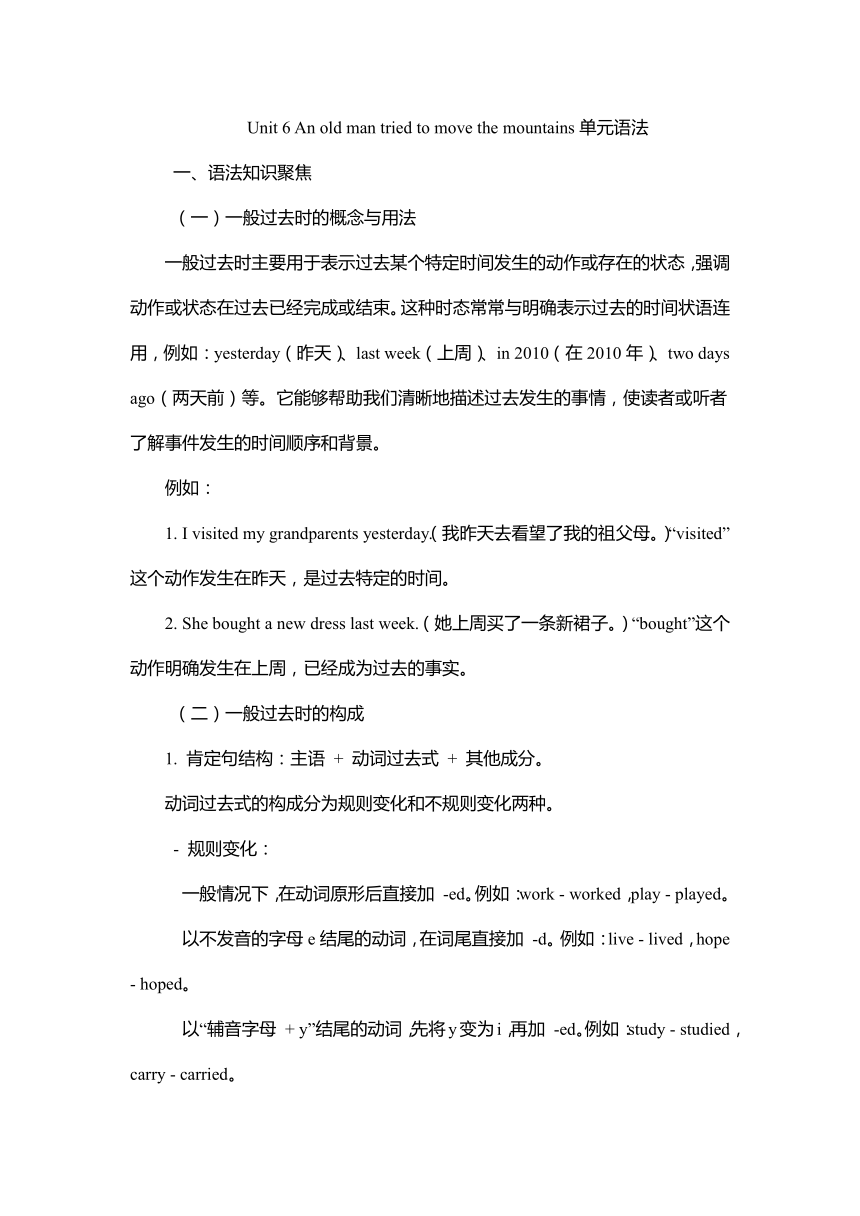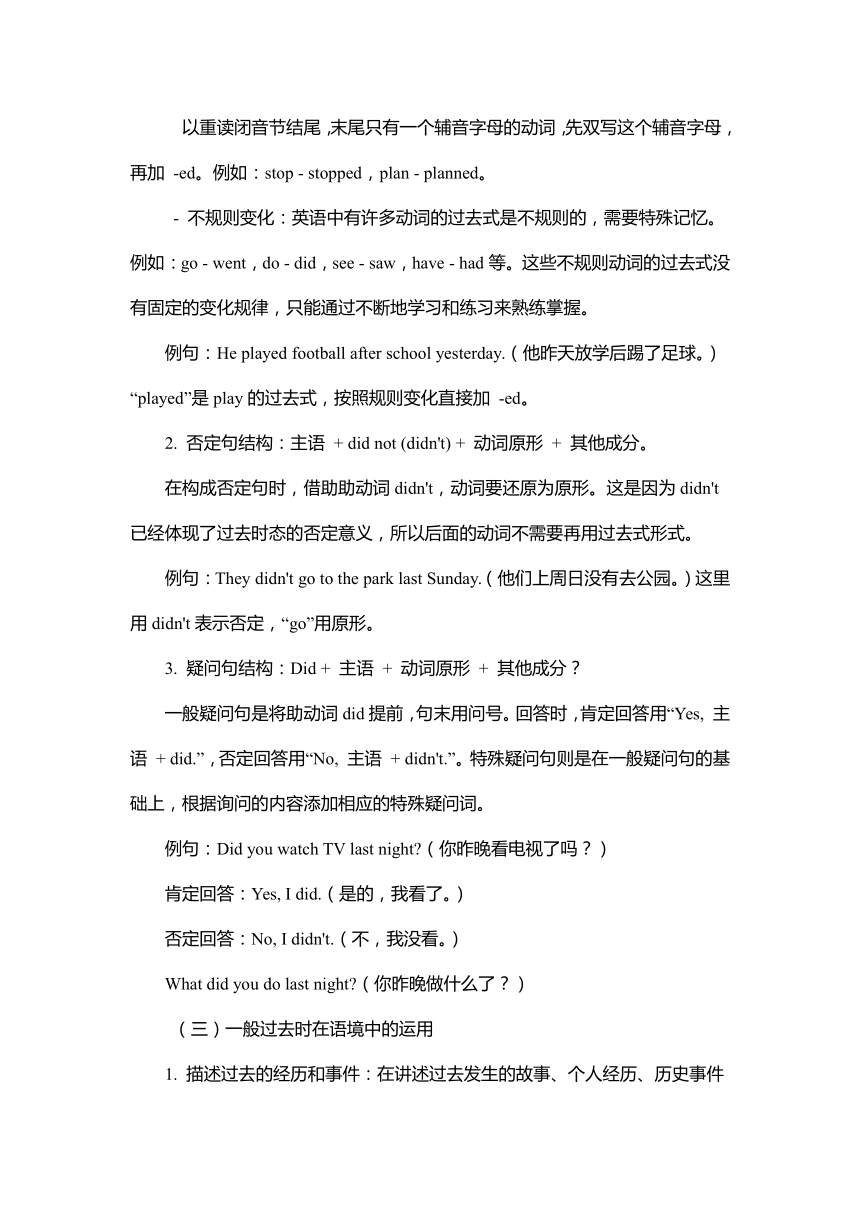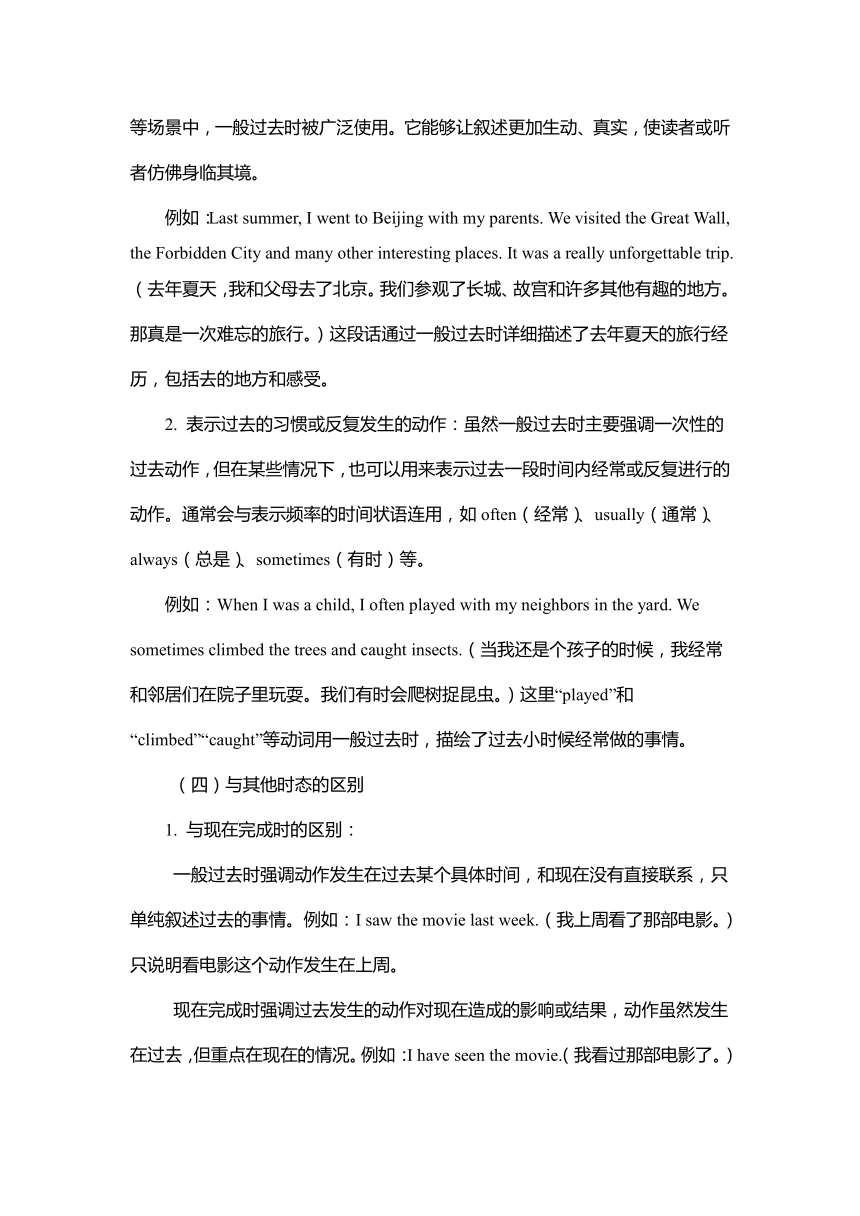八年级下册英语 Unit 6 An old man tried to move the mountains单元语法练习(含答案)
文档属性
| 名称 | 八年级下册英语 Unit 6 An old man tried to move the mountains单元语法练习(含答案) |  | |
| 格式 | docx | ||
| 文件大小 | 21.3KB | ||
| 资源类型 | 教案 | ||
| 版本资源 | 人教新目标(Go for it)版 | ||
| 科目 | 英语 | ||
| 更新时间 | 2025-03-03 09:37:23 | ||
图片预览



文档简介
Unit 6 An old man tried to move the mountains单元语法
一、语法知识聚焦
(一)一般过去时的概念与用法
一般过去时主要用于表示过去某个特定时间发生的动作或存在的状态,强调动作或状态在过去已经完成或结束。这种时态常常与明确表示过去的时间状语连用,例如:yesterday(昨天)、last week(上周)、in 2010(在2010年)、two days ago(两天前)等。它能够帮助我们清晰地描述过去发生的事情,使读者或听者了解事件发生的时间顺序和背景。
例如:
1. I visited my grandparents yesterday.(我昨天去看望了我的祖父母。)“visited”这个动作发生在昨天,是过去特定的时间。
2. She bought a new dress last week.(她上周买了一条新裙子。)“bought”这个动作明确发生在上周,已经成为过去的事实。
(二)一般过去时的构成
1. 肯定句结构:主语 + 动词过去式 + 其他成分。
动词过去式的构成分为规则变化和不规则变化两种。
- 规则变化:
一般情况下,在动词原形后直接加 -ed。例如:work - worked,play - played。
以不发音的字母e结尾的动词,在词尾直接加 -d。例如:live - lived,hope - hoped。
以“辅音字母 + y”结尾的动词,先将y变为i,再加 -ed。例如:study - studied,carry - carried。
以重读闭音节结尾,末尾只有一个辅音字母的动词,先双写这个辅音字母,再加 -ed。例如:stop - stopped,plan - planned。
- 不规则变化:英语中有许多动词的过去式是不规则的,需要特殊记忆。例如:go - went,do - did,see - saw,have - had等。这些不规则动词的过去式没有固定的变化规律,只能通过不断地学习和练习来熟练掌握。
例句:He played football after school yesterday.(他昨天放学后踢了足球。)“played”是play的过去式,按照规则变化直接加 -ed。
2. 否定句结构:主语 + did not (didn't) + 动词原形 + 其他成分。
在构成否定句时,借助助动词didn't,动词要还原为原形。这是因为didn't已经体现了过去时态的否定意义,所以后面的动词不需要再用过去式形式。
例句:They didn't go to the park last Sunday.(他们上周日没有去公园。)这里用didn't表示否定,“go”用原形。
3. 疑问句结构:Did + 主语 + 动词原形 + 其他成分?
一般疑问句是将助动词did提前,句末用问号。回答时,肯定回答用“Yes, 主语 + did.”,否定回答用“No, 主语 + didn't.”。特殊疑问句则是在一般疑问句的基础上,根据询问的内容添加相应的特殊疑问词。
例句:Did you watch TV last night (你昨晚看电视了吗?)
肯定回答:Yes, I did.(是的,我看了。)
否定回答:No, I didn't.(不,我没看。)
What did you do last night (你昨晚做什么了?)
(三)一般过去时在语境中的运用
1. 描述过去的经历和事件:在讲述过去发生的故事、个人经历、历史事件等场景中,一般过去时被广泛使用。它能够让叙述更加生动、真实,使读者或听者仿佛身临其境。
例如:Last summer, I went to Beijing with my parents. We visited the Great Wall, the Forbidden City and many other interesting places. It was a really unforgettable trip.(去年夏天,我和父母去了北京。我们参观了长城、故宫和许多其他有趣的地方。那真是一次难忘的旅行。)这段话通过一般过去时详细描述了去年夏天的旅行经历,包括去的地方和感受。
2. 表示过去的习惯或反复发生的动作:虽然一般过去时主要强调一次性的过去动作,但在某些情况下,也可以用来表示过去一段时间内经常或反复进行的动作。通常会与表示频率的时间状语连用,如often(经常)、usually(通常)、always(总是)、sometimes(有时)等。
例如:When I was a child, I often played with my neighbors in the yard. We sometimes climbed the trees and caught insects.(当我还是个孩子的时候,我经常和邻居们在院子里玩耍。我们有时会爬树捉昆虫。)这里“played”和“climbed”“caught”等动词用一般过去时,描绘了过去小时候经常做的事情。
(四)与其他时态的区别
1. 与现在完成时的区别:
一般过去时强调动作发生在过去某个具体时间,和现在没有直接联系,只单纯叙述过去的事情。例如:I saw the movie last week.(我上周看了那部电影。)只说明看电影这个动作发生在上周。
现在完成时强调过去发生的动作对现在造成的影响或结果,动作虽然发生在过去,但重点在现在的情况。例如:I have seen the movie.(我看过那部电影了。)强调现在“我”知道电影的内容,对现在有影响。
2. 与过去进行时的区别:
一般过去时表示过去某个时间完成的动作,强调动作的完成。例如:He wrote a letter last night.(他昨晚写了一封信。)重点在“写了”这个完成的动作。
过去进行时表示过去某一时间点或时间段正在进行的动作,强调动作的持续性。例如:He was writing a letter at 8 p.m. last night.(他昨晚八点正在写信。)突出八点那个时刻写信的动作正在持续。
二、学以致用
(一)语法填空
Last month, I 1.______ (have) a very special experience. I 2.______ (go) to a small village in the mountains with my friends. We 3.______ (plan) to go hiking and enjoy the beautiful scenery there. When we 4.______ (arrive) at the village, it 5.______ (be) already noon. The villagers 6.______ (be) very friendly and they 7.______ (show) us around the village. We 8.______ (see) how they 9.______ (grow) rice and vegetables. In the evening, we 10.______ (camp) by a small river. It was a really wonderful trip.
(二)阅读理解
Long long ago, there was a king. He loved horses very much. One day, he got a beautiful horse. He wanted to find out which was the fastest horse in his country. So he held a horse - racing competition. Many people joined the competition. There were ten horses in the race. The king watched the race carefully.
At the beginning of the race, all the horses ran very fast. A brown horse took the lead at first. But a white horse soon caught up with it. The two horses were running neck and neck. The king was very excited. He stood up and shouted, “Come on! Come on!”
In the end, the white horse won the race. The king was very happy. He gave the white horse to the winner. And he decided to hold more such competitions in the future.
1. What did the king love
A. Cats.
B. Dogs.
C. Horses.
2. Why did the king hold a horse - racing competition
A. Because he wanted to have fun.
B. Because he wanted to find the fastest horse.
C. Because he wanted to make money.
3. How many horses were there in the race
A. Eight.
B. Nine.
C. Ten.
4. Which horse took the lead at first
A. A white horse.
B. A brown horse.
C. A black horse.
5. Who won the race
A. The king.
B. The owner of the brown horse.
C. The owner of the white horse.
三、翻译句子
1. 他昨天买了一本有趣的书。
→ He bought an interesting book yesterday.
2. 他们上周参观了博物馆吗?
→ Did they visit the museum last week
3. 我爸爸昨晚没有看电视。
→ My father didn't watch TV last night.
四、写作任务
以“A Trip to the Zoo”为题,用一般过去时写一篇80词短文,描述你去动物园的经历,包括去的时间、和谁一起去、看到了什么动物、感受如何等。
答案
一 语法填空
答案:1. had 2. went 3. planned 4. arrived 5. was 6. were 7. showed 8. saw 9. grew 10. camped
二 阅读理解
答案:1. C 2. B 3. C 4. B 5. C
三 翻译句子
1. He bought an interesting book yesterday.
2. Did they visit the museum last week
3. My father didn't watch TV last night.
四 写作
A Trip to the Zoo
Last Sunday, I went to the zoo with my parents. We got there early in the morning. First, we saw the pandas. They were so cute, eating bamboo slowly. Then we watched the monkeys jumping around. They were really active and made us laugh a lot. We also saw lions, tigers and many other animals. It was a great day. I learned a lot about animals and had a lot of fun.
一、语法知识聚焦
(一)一般过去时的概念与用法
一般过去时主要用于表示过去某个特定时间发生的动作或存在的状态,强调动作或状态在过去已经完成或结束。这种时态常常与明确表示过去的时间状语连用,例如:yesterday(昨天)、last week(上周)、in 2010(在2010年)、two days ago(两天前)等。它能够帮助我们清晰地描述过去发生的事情,使读者或听者了解事件发生的时间顺序和背景。
例如:
1. I visited my grandparents yesterday.(我昨天去看望了我的祖父母。)“visited”这个动作发生在昨天,是过去特定的时间。
2. She bought a new dress last week.(她上周买了一条新裙子。)“bought”这个动作明确发生在上周,已经成为过去的事实。
(二)一般过去时的构成
1. 肯定句结构:主语 + 动词过去式 + 其他成分。
动词过去式的构成分为规则变化和不规则变化两种。
- 规则变化:
一般情况下,在动词原形后直接加 -ed。例如:work - worked,play - played。
以不发音的字母e结尾的动词,在词尾直接加 -d。例如:live - lived,hope - hoped。
以“辅音字母 + y”结尾的动词,先将y变为i,再加 -ed。例如:study - studied,carry - carried。
以重读闭音节结尾,末尾只有一个辅音字母的动词,先双写这个辅音字母,再加 -ed。例如:stop - stopped,plan - planned。
- 不规则变化:英语中有许多动词的过去式是不规则的,需要特殊记忆。例如:go - went,do - did,see - saw,have - had等。这些不规则动词的过去式没有固定的变化规律,只能通过不断地学习和练习来熟练掌握。
例句:He played football after school yesterday.(他昨天放学后踢了足球。)“played”是play的过去式,按照规则变化直接加 -ed。
2. 否定句结构:主语 + did not (didn't) + 动词原形 + 其他成分。
在构成否定句时,借助助动词didn't,动词要还原为原形。这是因为didn't已经体现了过去时态的否定意义,所以后面的动词不需要再用过去式形式。
例句:They didn't go to the park last Sunday.(他们上周日没有去公园。)这里用didn't表示否定,“go”用原形。
3. 疑问句结构:Did + 主语 + 动词原形 + 其他成分?
一般疑问句是将助动词did提前,句末用问号。回答时,肯定回答用“Yes, 主语 + did.”,否定回答用“No, 主语 + didn't.”。特殊疑问句则是在一般疑问句的基础上,根据询问的内容添加相应的特殊疑问词。
例句:Did you watch TV last night (你昨晚看电视了吗?)
肯定回答:Yes, I did.(是的,我看了。)
否定回答:No, I didn't.(不,我没看。)
What did you do last night (你昨晚做什么了?)
(三)一般过去时在语境中的运用
1. 描述过去的经历和事件:在讲述过去发生的故事、个人经历、历史事件等场景中,一般过去时被广泛使用。它能够让叙述更加生动、真实,使读者或听者仿佛身临其境。
例如:Last summer, I went to Beijing with my parents. We visited the Great Wall, the Forbidden City and many other interesting places. It was a really unforgettable trip.(去年夏天,我和父母去了北京。我们参观了长城、故宫和许多其他有趣的地方。那真是一次难忘的旅行。)这段话通过一般过去时详细描述了去年夏天的旅行经历,包括去的地方和感受。
2. 表示过去的习惯或反复发生的动作:虽然一般过去时主要强调一次性的过去动作,但在某些情况下,也可以用来表示过去一段时间内经常或反复进行的动作。通常会与表示频率的时间状语连用,如often(经常)、usually(通常)、always(总是)、sometimes(有时)等。
例如:When I was a child, I often played with my neighbors in the yard. We sometimes climbed the trees and caught insects.(当我还是个孩子的时候,我经常和邻居们在院子里玩耍。我们有时会爬树捉昆虫。)这里“played”和“climbed”“caught”等动词用一般过去时,描绘了过去小时候经常做的事情。
(四)与其他时态的区别
1. 与现在完成时的区别:
一般过去时强调动作发生在过去某个具体时间,和现在没有直接联系,只单纯叙述过去的事情。例如:I saw the movie last week.(我上周看了那部电影。)只说明看电影这个动作发生在上周。
现在完成时强调过去发生的动作对现在造成的影响或结果,动作虽然发生在过去,但重点在现在的情况。例如:I have seen the movie.(我看过那部电影了。)强调现在“我”知道电影的内容,对现在有影响。
2. 与过去进行时的区别:
一般过去时表示过去某个时间完成的动作,强调动作的完成。例如:He wrote a letter last night.(他昨晚写了一封信。)重点在“写了”这个完成的动作。
过去进行时表示过去某一时间点或时间段正在进行的动作,强调动作的持续性。例如:He was writing a letter at 8 p.m. last night.(他昨晚八点正在写信。)突出八点那个时刻写信的动作正在持续。
二、学以致用
(一)语法填空
Last month, I 1.______ (have) a very special experience. I 2.______ (go) to a small village in the mountains with my friends. We 3.______ (plan) to go hiking and enjoy the beautiful scenery there. When we 4.______ (arrive) at the village, it 5.______ (be) already noon. The villagers 6.______ (be) very friendly and they 7.______ (show) us around the village. We 8.______ (see) how they 9.______ (grow) rice and vegetables. In the evening, we 10.______ (camp) by a small river. It was a really wonderful trip.
(二)阅读理解
Long long ago, there was a king. He loved horses very much. One day, he got a beautiful horse. He wanted to find out which was the fastest horse in his country. So he held a horse - racing competition. Many people joined the competition. There were ten horses in the race. The king watched the race carefully.
At the beginning of the race, all the horses ran very fast. A brown horse took the lead at first. But a white horse soon caught up with it. The two horses were running neck and neck. The king was very excited. He stood up and shouted, “Come on! Come on!”
In the end, the white horse won the race. The king was very happy. He gave the white horse to the winner. And he decided to hold more such competitions in the future.
1. What did the king love
A. Cats.
B. Dogs.
C. Horses.
2. Why did the king hold a horse - racing competition
A. Because he wanted to have fun.
B. Because he wanted to find the fastest horse.
C. Because he wanted to make money.
3. How many horses were there in the race
A. Eight.
B. Nine.
C. Ten.
4. Which horse took the lead at first
A. A white horse.
B. A brown horse.
C. A black horse.
5. Who won the race
A. The king.
B. The owner of the brown horse.
C. The owner of the white horse.
三、翻译句子
1. 他昨天买了一本有趣的书。
→ He bought an interesting book yesterday.
2. 他们上周参观了博物馆吗?
→ Did they visit the museum last week
3. 我爸爸昨晚没有看电视。
→ My father didn't watch TV last night.
四、写作任务
以“A Trip to the Zoo”为题,用一般过去时写一篇80词短文,描述你去动物园的经历,包括去的时间、和谁一起去、看到了什么动物、感受如何等。
答案
一 语法填空
答案:1. had 2. went 3. planned 4. arrived 5. was 6. were 7. showed 8. saw 9. grew 10. camped
二 阅读理解
答案:1. C 2. B 3. C 4. B 5. C
三 翻译句子
1. He bought an interesting book yesterday.
2. Did they visit the museum last week
3. My father didn't watch TV last night.
四 写作
A Trip to the Zoo
Last Sunday, I went to the zoo with my parents. We got there early in the morning. First, we saw the pandas. They were so cute, eating bamboo slowly. Then we watched the monkeys jumping around. They were really active and made us laugh a lot. We also saw lions, tigers and many other animals. It was a great day. I learned a lot about animals and had a lot of fun.
同课章节目录
- Unit 1 What's the matter?
- Section A
- Section B
- Unit 2 I'll help to clean up the city parks.
- Section A
- Section B
- Unit 3 Could you please clean your room?
- Section A
- Section B
- Unit 4 Why don't you talk to your parents?
- Section A
- Section B
- Unit 5 What were you doing when the rainstorm came
- Section A
- Section B
- Review of Units 1-5
- Unit 6 An old man tried to move the mountains.
- Section A
- Section B
- Unit 7 What's the highest mountain in the world?
- Section A
- Section B
- Unit 8 Have you read Treasure Island yet?
- Section A
- Section B
- Unit 9 Have you ever been to a museum?
- Section A
- Section B
- Unit 10 I've had this bike for three years.
- Section A
- Section B
